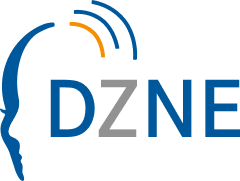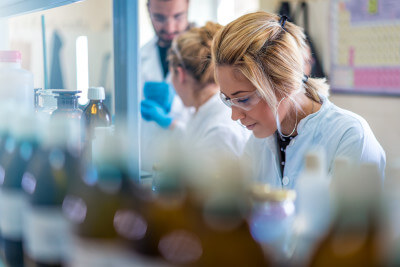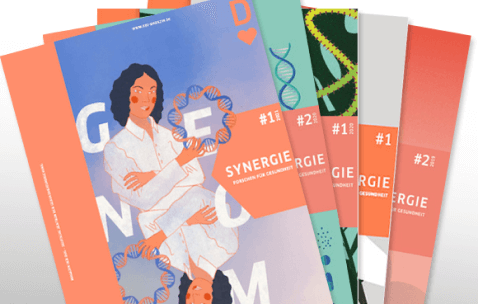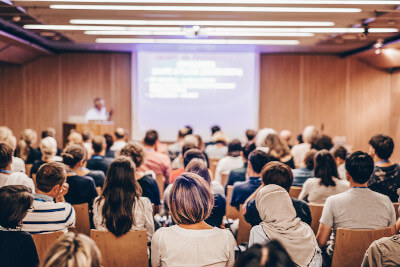
Patient participation
Patient advisory boards and other participation formats
In recent years, the German Centers for Health Research have created numerous opportunities for patients to actively participate in the research process.
DZD Citizens' and Patients' Advisory Board
The German Center for Diabetes Research (DZD) is a national network that bundles diabetes research and links basic research, translational research, epidemiology, and clinical application. It is funded by the BMBF and by the federal states in which the DZD partner sites are located. In 2021, the DZD established a Citizen Advisory Board (Citizens' and Patients' Advisory Board) to better address the needs and interests of people with diabetes and to improve the quality of research and communication.
The advisory board currently consists of seven members: People with type 1 and type 2 diabetes, as well as their relatives and non-affected people. The advisory board meets twice a year. The objectives were developed together with the members of the Citizen Advisory Board and set out in rules of procedure, which were adopted at the DZD General Assembly.
In the three meetings held so far, the planning of a clinical study on preventing secondary diabetes diseases was discussed. The members of the Citizen Advisory Board discussed the study protocol, the planned endpoints, patient education communication, and possible recruitment channels. The discussion points were then reviewed by the study team and various aspects were integrated into the study protocol. For example, additional endpoints such as side effects, drug interactions, comorbidities, or allergy effects as well as the discontinuation or addition of other medications were included. A questionnaire on quality of life was also integrated. At its subsequent meeting, the Citizen Advisory Board received feedback on which recommendations had been implemented by the study team.
DKFZ Patient Advisory Council for Cancer Research

In 2018, the German Cancer Research Center (DKFZ) became the first institution in Germany to establish a Patient Advisory Council specifically for research. Since then, it has been advising the DKFZ Board of Trustees from a patient perspective on new impulses for cancer research and on identifying unforeseen risks, obstacles, and unintended consequences of research strategies and projects. The DKFZ Board of Trustees also takes up specific recommendations from the Patient Advisory Council and implements them (e.g. Internal Review Board).
In addition, the Patient Advisory Council supports the DKFZ in promoting understanding and trust in modern cancer research among the non-scientific public and other non-scientific interest groups.
The DKFZ provides technical expertise to enable meaningful patient participation at eye level. The goal of the collaboration is to integrate the unique perspective and experience of people affected by cancer into the DKFZ's strategic planning from the very beginning.
In the course of the expansion of the National Center for Tumor Diseases (NCT) as part of the National Decade against Cancer (NDK), a separate National NCT Patient Council was founded. This National NCT Patient Council was involved on an equal footing from the very beginning, i.e. also during the concept development phase. For the first time, patient representatives are directly involved in the development of a long-term research institution.
DZNE-Patient Council

The aim of the DZNE-Patient Council is to raise awareness of disease-related issues that need to be researched and addressed as part of the DZNE mission. The Patient Council consults the DZNE Executive Board and DZNE scientists on issues related to the further integration of patients into society and the avoidance of stigmatization, as well as on health issues that can be improved through medical interventions or care approaches. The Executive Board advocates the cause of neurodegenerative diseases and DZNE research to the public, policymakers, and the media. The aim is to integrate the voices of patients into the core activities of research and to work together to raise public awareness of all issues related to neurodegenerative diseases. The Patient Council is composed of patients and representatives of patient organizations, elects its own chairperson and meets at least twice a year with the DZNE Executive Board. The Board is supported by the DZNE in all necessary functions.
Collaborative investigation of care processes in follow-up care for gestational diabetes
Gestational diabetes mellitus (GDM), an elevated blood glucose level during pregnancy, is associated with an increased lifetime risk of developing type 2 diabetes. In the GestDiNa_basic project, the Institute for Health Services Research and Health Economics (ISE) at the University of Düsseldorf and the German Diabetes Center (DDZ), in cooperation with numerous partners, are investigating the care situation in the follow-up care of GDM. The project is funded by the Innovation Fund of the G-BA (Gemeinsamer Bundesausschuss). The results will be used to develop a patient-centered care model.
Thanks to funding from the University of Düsseldorf, a participatory approach was integrated into the project, in which patients and citizens were actively involved as "co-researchers" for the entire duration of the project.
The co-researchers were involved in the research work of the project working groups according to their individual preferences, developed the care model together with the researchers, and contributed to publications. They were trained by the ISE, the Institute of General Practice (ifam), and the Department of the History, Philosophy and Ethics of Medicine, and received ongoing guidance and support. In addition, there was an exchange on communication strategies, new research ideas, and the evaluation strategy. Co-researchers were compensated for their work.
"Do it yourself" therapy for type 1 diabetics
In the TeQfor1 citizen science project, 77 users of do-it-yourself (DIY) systems for automated insulin delivery based on tissue glucose levels, worked with scientists to investigate how these systems affect the quality of life of people with type 1 diabetes. Until now, there have been few studies on this topic.
Using a citizen science approach, the research process in the TeQfor1 project was designed to enable people with type 1 diabetes to identify their own research questions, share their criteria for quality of life, and provide them with a range of (empirical) methods to use.
On the one hand, this meant that the citizen scientists could access the expertise of the academic researchers at any time and seek advice on any methodological or other issues that arose in the assessment of the DIY-APS. In this sense, the academic researchers were merely the "authority" ensuring the scientific quality and validity of the methods. On the other hand, the co-creative approach of the project meant that the exact objectives were to be defined only in the research process with the citizens.
The project was funded by the Helmholtz Association of German Research Centers.
PEAK: Patient Expert Academy for Tumor Diseases

The National NCT Patient Council and medical experts from the National Center for Tumor Diseases (NCT), which was expanded as part of the National Decade against Cancer (NDK), have established the National Patient Expert Academy for Tumor Diseases (PEAK) and have already piloted the first modules and individual courses. Since the summer of 2021, the academy has been run cooperatively by patient representatives, physicians, and other experts (initially as a pilot project and on a selective basis) with financial support from the BMBF. Together, practical and patient-oriented courses are being developed and implemented to prepare patient representatives to contribute their lived experience and expertise to the German healthcare system. In the future, this will take place through online and face-to-face courses in four key educational areas:
1. Patients as Partners in Research
2. Management, Establishment & Development of Patient Structures
3. Evidence-based Advocacy, and
4. Co-designing Digital Health.
Important: The academy is not only open to participants from the NCT sites, but also to all interested patient and self-help representatives from the German oncology scene.
PEAK aims to make a significant contribution to a healthcare system in which the early involvement of patients and their representatives - at eye level - is a matter of course in all areas of oncology.
Patient representation on the Scientific Advisory Board of the German Center for Lung Research
The international Scientific Advisory Board is the most important advisory body of the German Center for Lung Research (DZL). All strategic decisions regarding research and development at the DZL are coordinated with this committee.
Dr. Pippa Powell is also a member of the Scientific Advisory Board. She is the Director of the European Lung Foundation, a patient-led organization that brings together patients and interested members of the public across Europe with healthcare professionals to improve lung health.
As a member of the DZL's Scientific Advisory Board, Powell actively contributes the patient perspective to decisions on future research projects. For example, patients are interested not only in how a new drug or therapy can improve the medical parameters of their disease but also in their own quality of life. The practicality of therapy in everyday life also plays an important role.
Powell has been integrating the patient perspective into DZL research since 2016, ensuring that patients' voices are heard and that their concerns are considered in scientific practice.
Patient forums for mutual exchange
Access to the latest knowledge about their disease and current treatment options is very important to patients and their families. All five partner sites of the German Center for Lung Research (DZL), including the Lung Information Service, therefore offer regular patient forums for the exchange of information with DZL physicians working in science.
The patient forums are not a one-way street; information does not only flow from the experts to the patients. The discussions and Q&A sessions provide researchers with new insights into the needs, problems, and wishes of those affected. This exchange is essential for developing therapies that can be better integrated into daily life or for designing additional services to improve quality of life.
As an affected person, you can actively participate in these events and exchange ideas with scientists. Your perspective is important and will be valued.







